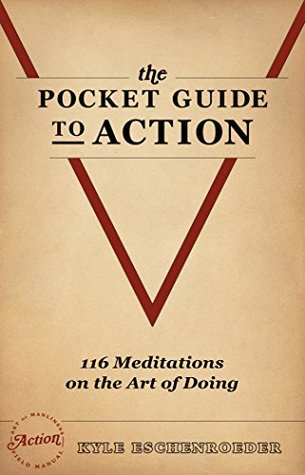The pocket guide to action summary

Book: The pocket guide to action by Kyle Eschenroeder
This book lists a hundred reasons to act, like removing paralysis, learning, making it easier, creating opportunities, or stress-relieving.
Personally, I made a habit to act immediately. I look for the smallest, fastest, and easiest tasks. I remove everything that blocks me. Action helps to get over paralysis by analysis and other invisible thinking traps.
Main ideas:
Act to create positive
Act to learn
- Genius is the ability to put in effect what is in our minds.
- Action brings facts, which bring clarity.
- Act to test theories.
- Failure brings experience, strength, knowledge, relationship.
- Action is worth much more than thinking without doing.
- The more experiments, the better.
- The knowledge that comes from action is more vivid and lasting.
- Action will bring you your uniqueness. You can think the same, not execution will always be different.
Act to make it easier
- Action will make you more resistant, pain-tolerant.
- Action train your courage, which will be your base level in a hard time.
- Action build momentum.
- Action shows what we are capable of.
- Action is your tool to express your mind. It will be bad at first. But after practice, your tool will be sharp and your real-world creations will be more defined.
- Greatness requires long practice.
- Einstein said, “I’m not so smart, I just stay with problems longer”.
Act to create your chance
- Act to conquer chance.
- Action creates unexpected opportunities.
Act to remove negative
Act to remove paralysis
- Don’t look for your passion. Act and your passion will grow.
- Bad questions lead to paralysis. Life is more about action than purpose.
- The need to know everything, to have complete information, leads to inaction.
- Act even if you don’t yet understand everything, it’s better than waiting to understand.
Act to avoid pain and wasted energy
- Not acting now leads to frustration and exhaustion.
- Don’t wait for motivation to act. Action motivates.
- Success requires much more action than visualization.
- Overthinking deplete you of the energy that could be used to act.
- You can’t waste time by acting, because even in the worst case you learn.
- Taking initiative is much rarer than the resources required to act.
Act to relieve stress, fears, and anxieties
- Inaction can come from the fear of rejection. But action will attract everyone else who admires you for getting over your fears.
- Action tame fears.
- Act to compensate for your insecurities.
- It’s about how hard you can get hit and keep moving forward.
- Repetitive, mechanical actions calm stress.
- Stress is like mosquitos, as soon as you stop moving, they find you. No mosquito can bite you if you’re constantly on the run.
- Action helps you refocus from failure to learning.
How to act
- Get around roadblocks instead of climbing them, whenever possible.
- Watch out to not aim too big, which leads to inaction and justifies failure.
- Instead of asking “why” ask “why not”.
- Act as if you had to.
- Stay hungry to act.
- To build a minimum viable product, remove any feature, process, or effort that doesn’t contribute directly to the learning you seek.
- You only need 2 weeks to test the vast majority of things.
- Don’t focus on your perceived probability of success, because it vastly underestimates the value of first-hand experience even if you can’t reach your goal. It’s often only once on the path that you’ll get the solutions to what made the journey look unachievable initially.
- Don’t consider if you “should” or if you are “ready” to do the right action.
- Start with a single habit. Practice until you do it without thinking. Then move to the next habit.
- Patience, meditation, reading, or visualization can be action IF they bring solutions, not push back action.